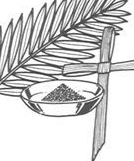Sermon preached by The Reverend Charles Royden
Ash Wednesday sermon
 So
today Lent begins, I hope you all enjoyed pancakes yesterday, and perhaps
some of you will refrain from eating flour, meat eggs and fat?
So
today Lent begins, I hope you all enjoyed pancakes yesterday, and perhaps
some of you will refrain from eating flour, meat eggs and fat?
Unlikely I guess
We don’t really give up foods these days for Lent, like many of the old
customs it has died out. But the meaning of some of these customs is
something which should be preserved and certain things need to be understood
so that we may enjoy the benefits which Christians over the centuries have
received from them.
Ash Wednesday Service is one such custom.
In a Christians culture which yearly becomes more self-indulgent, the
ancient Biblical traditions of covering one's head with ashes, wearing
sackcloth, and fasting is perhaps more meaningful than ever before.
It is fashionable to wear crosses of Gold, ordinary flat crosses, or
embellished fancy ones, I saw some suggestions this week in a magazine of
large chunky crosses on chains to be worn by fashionable brides across the
shoulder on long chains down to the waist. Such adornments are worn by
believer and unbeliever alike.
But the cross which we wear on this one day of the year is different. It is
the real deal. I want to consider this cross under three words which I think
summarise what it is about.
Mortality
The sign of the cross on our foreheads is a sign of mortality. The use of
ashes, made by burning palm crosses from the previous Palm Sunday, is very
symbolic.
As the cross is marked on our foreheads, the priest says, you are created
from dust, and to dust you will return. Ashes are reminders to us of our
mortality. God made the first human being by breathing life into dust, and
without God, human beings are nothing more than dust and ashes. This helps
us to be mindful and live in the light of our ultimate accountability before
God. There is nothing of which we may boast of ourselves, only of God.
Repentance
Ashes are a symbol of suffering and mourning. Not because we have to
endure a sparse Lent devoid of chocolate, but rather because we are sorry
for that which is wrong in or lives and we want to change or to use the
religious word - repent.
It is not fashionable to repent any more either. Increasingly we are told
that our sin is the responsibility of our parents, our upbringing, our lack
of opportunities or whatever.
Ashes are a recognition that we know there are things which we can do to
change and be better Christians. The ashes are a symbol of sorrow for that
which is wrong in our lives and a willingness to try and change. To wear
this cross is not about having a nice piece of jewellery, it is about being
prepared to change for the better
This is out of step with the world around us, like so much of our faith, it
is counter culture. But I like the bravery of the gesture of taking the
palms of the crowds, the shallow adoration of the masses, the triumphalism
which Jesus so rejected, and using those same palms which the crowds waved,
to make the crosses which mark out the faithful few.
This bring me to the last word and I will use the word comfort
Comfort
The church has, quite rightly, been accused of making people feel bad
about themselves, and that is true. We should never forget the tremendous
privilege of being human, created by God. This is a wonderful thing, and the
church has for too long focussed on our vileness and unworthiness.
But Ash Wednesday and what I have said about mortality and repentance, is
not about making people feel bad about themselves.
The mortality and repentance of Ash Wednesday reminds us that we are all
equal before God. Not one of us is better than anybody else. We all fall
short and have no claim upon God’s attention because we are more wonderful
human being. That is strangely a message of comfort!
The human tendency to think ourselves better than others is not a nice one.
Pride is a sin. However the abandonment of pride can lead to the discovery
of great personal spiritual development. Released from the need to be
beautiful, clever, successful we can discover more of what God wants us to
be.
May Ash Wednesday and all of Lent mean these things to us this year.
Charles Royden
